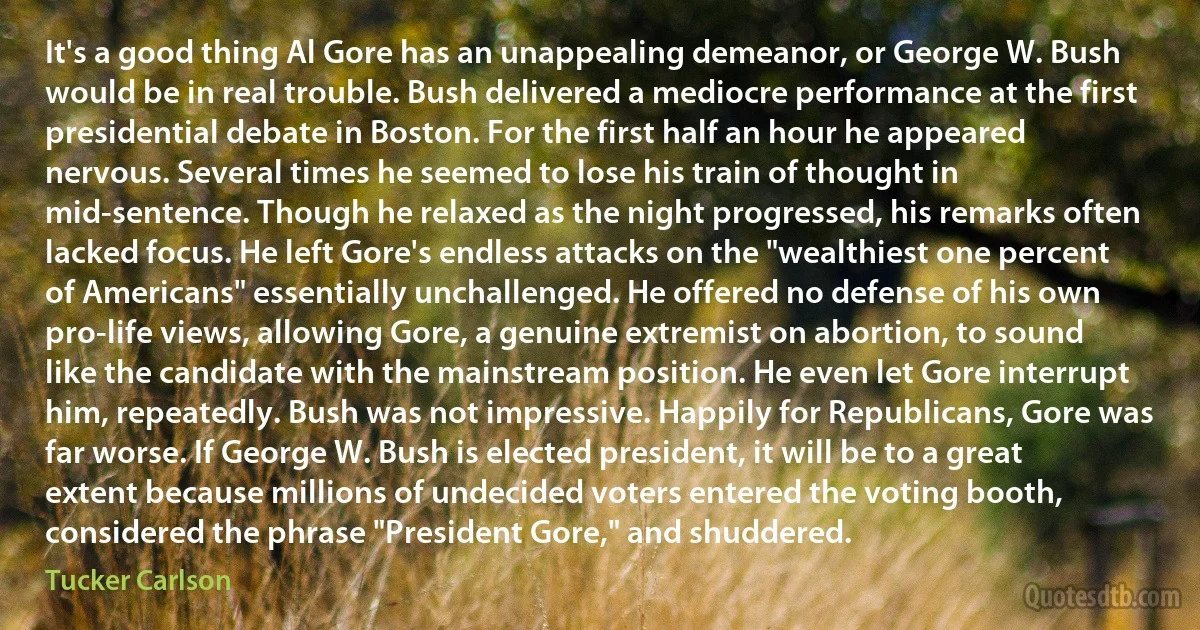
It's a good thing Al Gore has an unappealing demeanor, or George W. Bush would be in real trouble. Bush delivered a mediocre performance at the first presidential debate in Boston. For the first half an hour he appeared nervous. Several times he seemed to lose his train of thought in mid-sentence. Though he relaxed as the night progressed, his remarks often lacked focus. He left Gore's endless attacks on the "wealthiest one percent of Americans" essentially unchallenged. He offered no defense of his own pro-life views, allowing Gore, a genuine extremist on abortion, to sound like the candidate with the mainstream position. He even let Gore interrupt him, repeatedly. Bush was not impressive. Happily for Republicans, Gore was far worse. If George W. Bush is elected president, it will be to a great extent because millions of undecided voters entered the voting booth, considered the phrase "President Gore," and shuddered.
Tucker CarlsonRelated topics
abortion booth boston bush debate demeanor extremist far good great half hour left lose night position president real sound thing thought times train trouble voting wealthy worse mainstreamRelated quotes
Protocols:
Number 1, paras. 9,10
If every State has two foes, and if in regard to the external foe it is allowed and not considered immoral to use every manner and art of conflict, as for example to keep the enemy in ignorance of plans of attack and defense, to attack him by night or in superior numbers, then in what way can the same means in regard to a worse foe, the destroyer of the structure of society and the commonweal, be called immoral and not permissible?
Is it possible for any sound logical mind to hope with any success to guide crowds by the aid of reasonable counsels and arguments,, when any objection or contradiction, senseless though it may be, can be made and when such objection may find more favor with the people, whose powers of reasoning are superficial?
Graves: The basic ideas are the same despite word changes like... "two kinds of enemies” versus, "two foes.”.

Will Eisner
It was this indifference to the quality of his material that earned Liszt the contempt of his most distinguished contemporaries and of many of the most respectable critics and historians of posterity. It was, nevertheless, his greatest strength. It made it possible for him to manipulate the material ruthlessly, to concentrate on effects of realization with unprecedented intensity, and to integrate styles and techniques of performance into composition in a new way. His invention of novel keyboard effects and his mastery of musical gesture have always been undervalued, especially by pianists of the German school who prefer the kind of music that can be executed while soulfully regarding the ceiling. On the whole, the most genuine understanding of his music has been displayed by musicians of eastern Europe, and he may almost be considered as the founder of Russian pianism.

Charles Rosen
From the beginning, I knew the public reaction to my decisions would be colored by whether there was another attack. If none happened, whatever I did would probably look like an overreaction. If we were attacked again, people would demand to know why I hadn't done more. That is the nature of the presidency. Perceptions are shaped by the clarity of hindsight. In the moment of decision, you don't have that advantage. On 9/11, I vowed that I would do what it took to protect America, within the Constitution and laws of our nation. History can debate the decisions I made, the policies I chose, and the tools I left behind. But there can be no debate about one fact: After the nightmare of September 11, America went seven and a half years without another successful terrorist attack on our soil. If I had to summarize my most meaningful accomplishment as president in one sentence, that would be it.

George W. Bush
If I am elected President, I will work with anyone who sincerely wants to get this country moving again. I will listen to any idea that is offered in good faith and intended to help solve our problems, not make them worse. I will seek the counsel of members of Congress from both parties in forming government policy before I ask them to support it. I will ask Democrats to serve in my administration. My administration will set a new standard for transparency and accountability. I will hold weekly press conferences. I will regularly brief the American people on the progress our policies have made and the setbacks we have encountered. When we make errors, I will confess them readily, and explain what we intend to do to correct them. I will ask Congress to grant me the privilege of coming before both houses to take questions, and address criticism, much the same as the Prime Minister of Great Britain appears regularly before the House of Commons.

John McCain
...capitalism is basically a system where everything is for sale, and the more money you have, the more you can get. And, in particular, that's true of freedom. Freedom is one of the commodities that is for sale, and if you are affluent, you can have a lot of it. It shows up in all sorts of ways. It shows up if you get in trouble with the law, let's say, or in any aspect of life it shows up. And for that reason it makes a lot of sense, if you accept capitalist system, to try to accumulate property, not just because you want material welfare, but because that guarantees your freedom, it makes it possible for you to amass that commodity. [...] what you're going to find is that the defense of free institutions will largely be in the hands of those who benefit from them, namely the wealthy, and the powerful. They can purchase that commodity and, therefore, they want those institutions to exist, like free press, and all that.

Noam Chomsky
